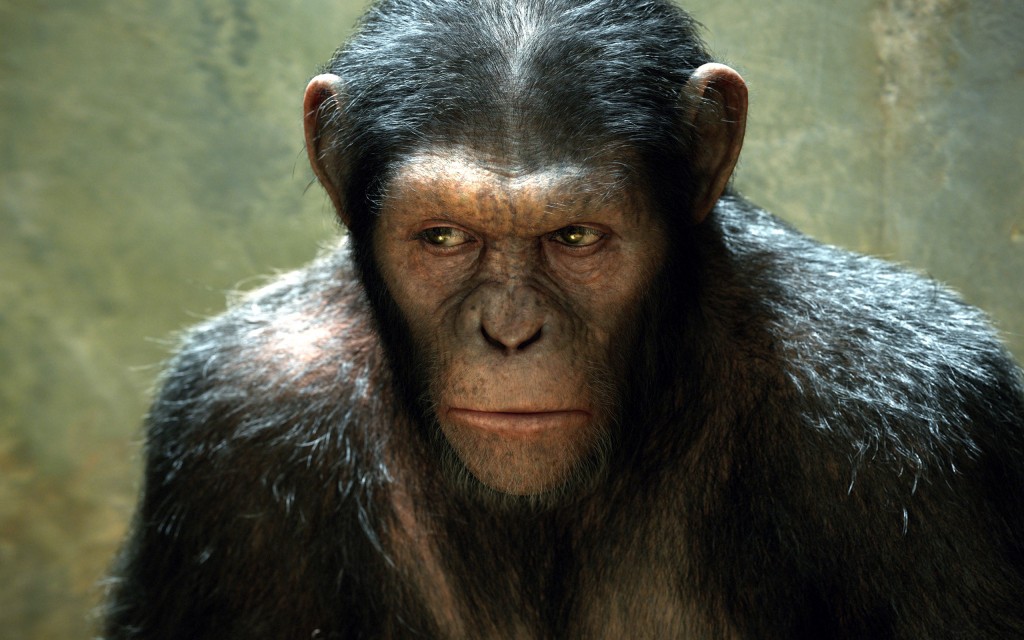Balls and Walnuts
more than you ever wanted to know
Rooting for the apes
We all know how this ends: the humans decline to a faint shadow of their former might, while the apes take over the joint. And just in case there are any noobs in the audience who never saw the Charles Heston original (or, for that matter, the loathsome Mark Wahlberg remake), the movie is named RISE of the Planet of the Apes. Not, The Apes Make a Bit of a Splash Before Getting Themselves Snuffed. The trick, then, lies in building narrative drive when everyone in the audience knows the ending, and the challenge lies in making it an enjoyable business.
For one thing, you gotta start with a hero. Here’s Caesar (yes, he has the same name as Cornelius and Zira’s baby in movie #3 — the filmmakers stayed true to canon at least in that one detail), played by Andy Serkis (Gollum!)

A moment ago, I tried to identify for Jake a few notable characteristics of heroes. They have to be in nearly every scene (check), and the writer needs to show some care not to trash sympathy for the hero (check), lest he end up with, for lack of a better term, a creep. Finally, the hero must take a lot of abuse (check). By the way, does anyone recall the proper term for this last feature? I learned it in high school and I can’t recall the details.
And in Caesar’s heroic status he has no competitors. I guess we are supposed to like his “father,” Dr. Will Rodman (James Franco), a Gen Sys* scientist working on the cure for Alzheimer’s disease. Turns out this virus also increases the intelligence of its host, which spells $$$ for the corporate overlords of Gen Sys. But Rodman is such a dip. He calls apes “monkeys,” something no self-respecting scientist would ever do. And when he meets some initial set-backs to his quest to cure his father’s Alzheimer’s with viral-mediated gene therapy, what does he do? Create a more virulent, air-borne vector. So not a hero. More like a Bond villain, really. But he has a cute girlfriend (Freida Pinto, whom some of you may have seen in Slumdog Millionaire) so that’s okay.
I have to think that Dr. Rodman’s dweebiness is intentional. He’s a weak man, and when Caesar blames him for his (Caesar’s) misfortunes, we can’t help but blame him, too. But I’m getting ahead of myself.
Here, skip this paragraph if you’re worried about some mild spoilers. In fact, maybe skip the rest of the post. Anyway: when Rodman’s earlier virus makes a test subject go berserk, he’s forced to put down all the apes in his group. But it turns out the berserker was merely protecting her baby — Caesar! Who has mommy’s green eyes, indicating that he, too, has inherited the intelligence of his mother. Rodman smuggles Caesar home and raises him like a human child, taking no precautions whatsoever even when Caesar grows up to be a big, powerful adult chimpanzee. For that matter, Rodman’s dad (John Lithgow) is not doing too well, Rodman’s guinea pigging efforts notwithstanding, and should probably be in a care facility. So when Caesar’s and Dad’s lack of proper housing leads to a violent attack on a neighbor, Rodman is really to blame here. Just sayin’. And that lands Caesar in a primate care facility which Rodman has apparently neither researched nor examined beyond the most superficial tour. This does not end well**. Man, the more I think about Franco’s character, the more he pisses me off. Monkeys. Really.
The movie’s science does not hold up to close scrutiny. There’s that whole virulent respiratory virus thing, for starters. But I don’t go to a movie like this thinking I’m gonna have a hard SF experience.
So what do we have, really? Obnoxious humans whom we are only too happy to see self-immolate. (And they do. Gloriously. But you’ll have to sit through the credits to see it.) And a rage-filled Caesar who has our every sympathy. Our attachment to Caesar and desire to see him and his fellow apes shed their chains, that’s what drives this film forward. Yeah, I loved it. And so does PETA. Okay, so PETA loved it because the filmmakers used CGI apes, not because the humans snuff it (we presume) in the end. But I’m betting more than a few PETA members loved seeing the apes get back at the research scientists.
Not a subtle movie, though. Never thought I would say this, but I think the original Planet of the Apes had a good deal more moral ambiguity than this one. Perhaps today’s audiences can’t handle moral ambiguity?
D.
*Not to be confused with GeneSys.
**Unless you’re Caesar
The hero taking a lot of abuse? Are you referencing the heroic quest where the hero goes through trials/tribulations? I never hold that stuff in my head either.
Yeah, waddya call that?
Don’t have my notes here. ]:
[T]he hero must take a lot of abuse […] does anyone recall the proper term for this [?]
Authorial sadism.